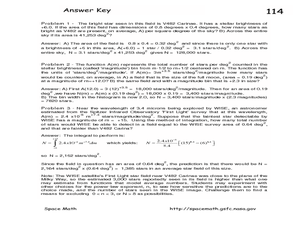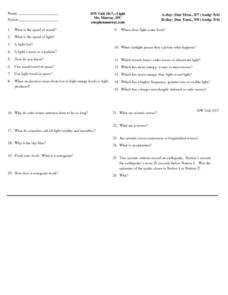Curated OER
Slinky Movement Lab
In this wave activity, learners use Slinky's to observe the properties of waves. They observe longitudinal waves, transverse waves, traveling waves and standing waves and record their observations. They calculate the frequency and...
Curated OER
Sounds Good to Me
Students determine density and hardness of wood samples based on several investigations. In this physical science and music lesson, students visit four centers and perform tests on wood samples to determine densities and hardnesses. They...
Curated OER
Woody Sine
Students explore the concept of sine. In this sine lesson, students create a sine graph from tooth picks. Students create a unit circle with tooth pick length radius. Students then take the tooth picks from the unit circle and put them...
Curated OER
Exploring Power-Law Functions Using WISE Data!
In this power-law functions worksheet, students solve 3 problems using data from the Wide-field Infrared Survey Experiment in the constellation Carina. Students use a photograph to determine the number of stars as bright as the brightest...
Curated OER
The Speed of Galaxy Q2125-431
In this speed of a galaxy worksheet, learners use a given equation for the speed of an object and they use the spectral lines for Hydrogen Alpha and Beta from the Seyfert galaxy to answer 6 questions. They determine the observed...
Curated OER
Why Are Hot Things Red?
In this radiation and temperature worksheet, students use 2 methods to derive the Wein Displacement law that shows the relationship between the temperature of a body to the frequency where the Planck curve's value is at its maximum....
Curated OER
Fermi Observatory Measures the Lumps in Space
In this gamma-ray worksheet, learners read about the Fermi Gamma-ray Observatory and how it measures the invisible lumps in space. Students solve 3 problems using an equation to determine the time that gamma-rays travel in space and the...
Curated OER
Refraction Through a Triangle
In this refraction through a triangle activity, students use a given diagram of light striking a triangular piece of plexiglass to determine the light ray's angle of incidence, the ray's angle of refraction, they use Snell's Law to...
Curated OER
Find the Mystery Lines...If You Can!
In this atomic spectral lines worksheet, students observe a diagram of the spectral lines, their different wavelengths and their intensity. They solve 4 problems which include interpreting the scale, matching up tabulated lines with the...
Curated OER
Measuring Star Temperatures
For this measuring star temperatures, learners find the temperature of a star using Planck's curve and the Wein Displacement law. Students also find the peak wavelengths for given stars using Planck's curve.
Curated OER
Ocean in Motion
In this ocean in motion worksheet, students complete a crossword puzzle given 21 clues about waves, currents, the tides, winds, and surface water.
Curated OER
Characteristics of Waves
In this characteristics of waves learning exercise, students answer 9 questions about the structure of waves, the types of waves and the components of waves. They describe the frequency of a wave and calculate the velocity and frequency...
Curated OER
The Effects of Light Intensity and Wavelength on the Rate of Photosynthesis
Students use an on line website to simulate the effects of light intensity and wavelength on photosynthesis. In this photosynthesis lesson plan, students determine how wavelength of light and intensity of light affect the rate at which...
Curated OER
Spectroscopy Homework
In this spectroscopy worksheet, students answer 4 questions about spectrometers, spectroscopy, flame tests and the energy of given wavelengths of light.
Curated OER
HW Unit 10:2-Harmonic Motion
For this harmonic motion worksheet, students answer 9 questions about pendulums, a slinky and characteristics of harmonic motion. They identify the changes in waves as the amplitude gets bigger and interpret a graph of position vs. time.
Curated OER
Harmonic Motion and Light Review
For this harmonic motion and light worksheet, students review concepts such as identifying motion as harmonic, linear or wave motion, analyzing graphs of position vs. time and pendulum movement, answering questions about light and the...
Curated OER
Light
In this light worksheet, students match 12 terms related to light and the electromagnetic spectrum to their definitions, they order waves by their speed, they analyze the energy and wavelengths of the electromagnetic spectrum and they...
Curated OER
Standing Waves
In this standing waves worksheet, students read about standing waves, their nodes, their anti-nodes and their wavelengths. They are given diagrams of harmonics and the equation to find the frequency of harmonics. Students match terms...
Curated OER
Sound
In this sound worksheet, students read about sound waves, how they are graphed, what frequency is and how it's related to pitch and the speed of sound. Students solve 8 sections of problems including matching terms related to sound to...
Curated OER
Waves
In this waves worksheet, high schoolers read about harmonic and linear motion in waves as well as the two types of waves. They match 5 terms to their definitions about the structure of waves, they solve for the wavelength, frequency and...
Curated OER
HW Unit10:8- Color
In this color activity, students answer 16 questions about light, color and wavelength. They label a graph of position vs. displacement and answer questions about the graph including finding the frequency, amplitude, and wavelength.
Curated OER
HW Unit 10:7-Light
In this light worksheet, students answer twenty six questions about sound and light and how they both travel. They also answer questions about different types of waves in the electromagnetic spectrum such as radio waves, visible light,...
Curated OER
HW Unit 10:6-Standing Waves
In this standing waves worksheet, students answer 9 questions about graphs of various waves. They identify standing waves and their nodes, anti-nodes, wavelengths, amplitude, frequency and number of cycles.
Curated OER
Starlight, Star Heat
In this stars worksheet, students read how astronomers calculate the temperature of a star by measuring its color. Students use a chart showing star temperatures and colors to complete 3 short answer questions.

























